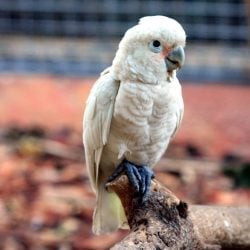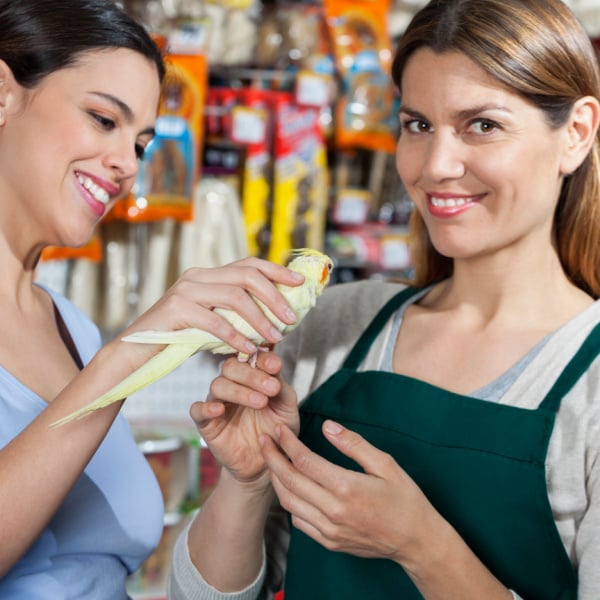Last Updated on by Mitch Rezman
“Parrots Secrets Newsletter”
Released On: July 12, 2011
This special issue includes:
1) “11 Things You MUST Consider When Purchasing
a Parrot” by Nora Caterino
2) “Free Content for Your Birds/Parrots Web Site or Ezine!”
3) Tell Us What You Think!
I realize that most of you already own parrots.
However, if you are like most parrot parents, you are tempted from time to time to add to the flock. Whether you are buying your first parrot or your 10th, the considerations are the same and you want to be smart.
There really can be too many parrots for some people while other people are happy to care for dozens and dozens or even hundreds of parrots.
I’ve learned these things that must be considered because of my personal experiences and the experiences of my friends in relation to becoming new parrot parents. Yet, I have had to make mistakes to learn from them myself. Even with years of experience with parrots, it is easy to make an error if you don’t go back to the list of factors and review them from time to time.
1. What is your motivation to buy a first parrot or to add to the flock?
You’ve all read about my SunDance, the sun conure I had from age eight weeks until her death. I’d like to tell you how wrong my motivation for buying her really was. Now, understand that I enjoyed 17 happy years with her and loved her dearly, but my true motivation was flawed. I would not have missed those years with her for anything, however.
My honest motivation was that I had just moved from cold and snowy Colorado back to my former home in Cape Canaveral, Florida and bought a brand new bicycle. Everyone in that area rides their bicycles around town and on the beach and very good bicycle paths are provided.
I had seen several people riding their bicycles with parrots and I wanted one to ride my bike with me! I already had cockatiels and budgies but I wanted a beautiful, striking, bigger parrot to show off riding around town. Now, realize I had already been published in Bird Talk magazine and I was dumb enough to think along these lines of motivation.
Guess what? SunDance was TERRIFIED at the sight of a bicycle! There was no way in the world that I could get her to even consider sitting on me while I was NEAR the bike, much less on board!
However, things worked out and I knew enough about parrots to love her for what she was and we were happy, even though I never went bike riding with a parrot – but then how safe would that be, anyway? I would NOT recommend it at all!
Why do I tell you this? I am sharing this because it is so very important to search for ourselves and find exactly why
we want a parrot. If we want it as something to impress our friends or to show off as a status symbol, we are using the
wrong motivation.
The only right motivation is that we have a place in our lives that will provide room and care for the parrot and we
want to give of ourselves and our time to the parrot. After all, it takes work and dedication to keep parrots properly and they require a consistent schedule and daily attention.
2. Is the expense something you can afford
initially and over time?
Parrots are NOT inexpensive. The bigger parrots cost lots of money. Sure, a budgie isn’t a major investment, nor is a
cockatiel, but you also have to provide proper housing, food, treats, toys, vet care, and you have an expense in time you have to spend with the parrot.
If you want a large parrot, before deciding you have the money for the parrot, price the large cage it will call its
home. A large, sturdy parrot cage that would be roomy enough for a blue and gold macaw, for example, can cost as much as the parrot!
Toys for big birds can run into money as well. Some of our subscribers have stated in their interviews an average expense of up to $500 per month for the total average expense of caring for their parrots – and they only have one, two or three! Sure, this includes their wing clipping or other grooming by a vet and health checkups, plus lots and lots of toys and treats. Even a budgie, however, costs money and it has to have the things it needs to be happy and entertained.
3. Consider family structure and family stability.
Right now you may be a single person with lots and lots of time to spend with a long-lived parrot. But what happens to
the parrot if you…
a) Marry and have children?
b) Become unemployed? (Do you have the resources to care for the parrot during times of financial stress?)
c) Are you in college and have time right now, but once you enter your new career, will you be working long days and
leaving before daylight only to return after dark?
d) Do you travel a great deal or plan long international trips?
SunDance loved me through more than one marriage, several jobs, different housing and even different family components. However, that might not be the case for you. Think long and hard about your future plans. She traveled with me at times and other times visited with her Grandmother (my mom) or with another trusted friend or relative.
I once had to change roommates because SunDance could NOT stand the roommate I chose. She was right and I was wrong, but nonetheless, I had to go through finding another roommate because I couldn’t afford the housing alone. There’s a lot to consider about what could happen in the future.
Also, parrots are long-lived and plans must be made for their care should something happen to you. They can easily
outlive their owners.
One African Grey in Alaska was documented by Bird Talk magazine to be 112 years of age!
4. Do you have time and desire to provide attention to your parrots every single day?
One mistake made by many parrot buyers is that they buy a hand-fed just weaned baby parrot and, because the parrot is new, they pay loads of attention to the parrot. Then, reality sets in and the parrot doesn’t get nearly as much attention as it previously was lavished with. Some parrots become stressed out by this and begin to pluck feathers.
Cockatoos are especially emotional parrots and, if you choose a cockatoo, you should begin at Day One paying only
as much attention to the parrot as you reasonably expect to provide on a daily basis.
5. Do you have reasonably consistent work hours
or live on a consistent schedule?
Parrots need consistency in their lives. They live on a schedule and they expect their humans to do the same. They can adjust to different schedules to an extent as long as there is consistency. TOO MUCH CHANGE can result in a stressed-out parrot!
Parrots want to be awake, uncovered, and fed in the morning. Many of them like to get up at sunrise and will tell you about it if you try to sleep in. They want to settle in for the night not too long after it gets dark outside. During the hours between rising and going to bed for the night, they want their humans to pay attention to them.
6. Do you have the time and willingness to provide
proper training on a consistent basis?
Parrots need to learn good manners through basic training. If you want your parrot to learn to talk, you’ll have to provide that training as well. You will find that you need to teach your parrot what belongs to it and what it should not bother; keeping in mind they only learn this to a point because they are mischievous, curious creatures by nature.
Parrots can actually be potty trained, but only through consistency and training can that happen. Some talented parrots can learn to use speech in context to let their humans know what they want, but only if the time is spent to teach them the words.
A parrot, as a rule of thumb, takes almost as much time as a two-year-old human to raise properly! But the parrot
does not grow up and go to college after 16 more years like the two-year-old child! It’s a commitment of many years!
7. Are you willing to learn about your parrot and ensure it has the proper care?
In order to care for a parrot properly, you need to know what species it is and what that species needs to be healthy
and happy. Some parrots, Lorikeets and Hyacinth macaws for example, have special dietary needs that must be met in order to be healthy.
There are State laws in the United States about certain species and I’m sure this is true in other countries as well.
Quaker parrots, for example, are illegal to transport in some states and in others, they are illegal to even have possession of. Some states require closed bands to remain on the parrots; others do not.
The parrot owner has to investigate and learn about their specific species and how to best create a healthy, happy home for the parrot.
8. Do you have space in your home for a parrot
or another parrot?
I once lived in a one-bedroom apartment with a dozen small parrots. That isn’t for everyone, however. If you choose a
large parrot, you’ll have to have sufficient space to put a large cage and you’ll probably want a place for a play gym.
Parrots are messy and you can’t just put their cage anywhere. They’ll often sling food onto the walls and make a mess with their food on the floor.
9. What is your housing situation?
If you rent your home, are pets allowed? Are the walls sufficiently sound-proof so that your parrot will not bother
neighbors and result in complaints against you? As I said, I did live in a one-bedroom rental apartment for years with a sun conure without getting any complaints. Whether that had to do with my neighbors or fate, I can not say. I do know that most of my neighbors loved seeing SunDance and our walls were not thin. Many apartments or attached homes
allow lots of noise to travel between apartments.
“A 747 Jumbo Jet produces as much as 140 decibels of noise. Peacocks have been registered at 115 db. Moluccans hold the record as the loudest bird on earth at 135db (average = 120db)” by the San Diego Zoo.
10. Do you have the dedication needed to give a parrot everything it needs?
Just as with raising a child, there will be times that you have to spend money you may prefer using for something else
to obtain things your parrot needs such as health care, a new cage or toys. Also, your parrot will expect you to be with it during part of every day.
I hear too many stories about people who obtain untamed parrots and then don’t have the dedication to tame them. It
can take months or even years to get an untamed adult parrot to become trusting of humans. Do you have that kind of dedication?
This is a good time to bring up the differences of buying an adult untamed parrot and a hand-fed well-socialized baby
parrot. If you want to ensure you have a loving pet that will allow you to handle it and pet it, you should BUY A HAND-FED BABY.
Even with a hand-fed parrot, if the parrot is allowed to exist as part of the parrot flock, it will learn to be a parrot. If a baby parrot is placed in a loving family as an only parrot and you follow guidelines about spending time every day with your parrot, you’ll almost certainly have a loving, cuddly parrot.
Some untamed adult parrots become trusting and loving; this depends on the parrot and the humans involved as well
as dedication and consistency.
11. Do you want a parrot that talks and will NOT be happy with a non-speaking parrot?
The only way to obtain a parrot that is guaranteed to talk is to buy one that is already talking! There is absolutely no guarantee that any specific parrot of any species will talk. There are African Greys that never learn to say a word and others that seem to know most of the Webster’s Dictionary. Can you love a parrot no matter whether it ever speaks? Will you love the parrot for what it brings to your life, no matter what?
If you don’t feel you can be happy unless you have a parrot that talks, you should either buy a parrot that already talks
or look again at your reasons for wanting the parrot. If you do want a parrot that talks and is also tame and loving, you can purchase a species that is known for talking ability and then train the parrot, hoping it will learn to speak. But you have to keep in mind that there are absolutely… -No guarantees no matter what anyone tells you!
Final Thoughts
If you consider all these factors and become well educated about the parrot you intend to purchase, you’ll make a very
good parrot parent.
Remember, other pets can harm a parrot. Today I have the pleasure of owning BabyLove, a cockatiel who will never have a pretty tail again because a former, less than attentive owner let a dog attack him. Today, BabyLove lives in a home where there are other birds and he enjoys spending most of his time outside the cage since I am from the comfort of work. But in the past was not so wonderful. Someone obtained this loving boy without having thought their plans through well enough and it almost cost BabyLove his life and he will carry the scars all his remaining life.
If, however, you find yourself thinking you may not be able to provide enough attention or your other pets may cause danger or stress, you might want to think about your purchase further. It’s very sad when someone spends thousands on a parrot only to learn they really don’t want to own the parrot!
Written and approved by the Windy City Parrot Content Team
5/22/2022
Mary L. responds,
I benefited from reading the recent article about adding a bird to my flock.
I have 2 CAG’s 1 TAG & a quacker. I recently lost my Senegal.
All are rescues but one CAG came up from Fl. in a truck with other birds to be sold along the ride North.
He was terrified – screeching, biting if I approached him.
It took a year for him to accept me/trust me. He is now a loving bird that steps up when asked & walks over to me for a scratch.
My 4 birds live happily together with no issues like plucking because they are in a flock & watch PBS kids on TV.
They aren’t bored. They are free-flighted & are out of their cages under supervision for about 4 hrs. a day.
I enjoy your email thanks
Author Profile

Latest entries
 Bird & Parrot CareJune 20, 2025Understanding the Best Way to Use Prevue Pets Mimic Me Voice Trainer
Bird & Parrot CareJune 20, 2025Understanding the Best Way to Use Prevue Pets Mimic Me Voice Trainer Bird BehaviorJune 6, 2025How Do I Keep My Parrot From Dumping His Food Every Day?
Bird BehaviorJune 6, 2025How Do I Keep My Parrot From Dumping His Food Every Day? Birds & LightingMay 16, 2025I Am Seeking Clarity About Lighting for My Birds Cage
Birds & LightingMay 16, 2025I Am Seeking Clarity About Lighting for My Birds Cage Bird RescueApril 29, 2025How Do We Re-Home a 17 yr Goffin Cockatoo?
Bird RescueApril 29, 2025How Do We Re-Home a 17 yr Goffin Cockatoo?



